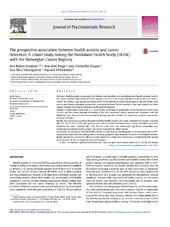| dc.contributor.author | Knudsen, Ann Kristin | en_US |
| dc.contributor.author | Berge, Line Iden | en_US |
| dc.contributor.author | Skogen, Jens Christoffer | en_US |
| dc.contributor.author | Veddegjærde, Kari-Elise | en_US |
| dc.contributor.author | Wilhelmsen, Ingvard | en_US |
| dc.date.accessioned | 2016-03-18T09:29:07Z | |
| dc.date.available | 2016-03-18T09:29:07Z | |
| dc.date.issued | 2015-08 | |
| dc.Published | Journal of Psychosomatic Research 2015, 79(2):148-152 | eng |
| dc.identifier.issn | 0022-3999 | |
| dc.identifier.uri | https://hdl.handle.net/1956/11703 | |
| dc.description.abstract | Objective: Health anxiety is associated with distress and disability, and overutilization of health services, but it is not known whether high levels of health anxiety may lead to increased detection of severe diseases such as cancer. By linking a large population based health study with the national cancer registry, the aim of the study was to investigate a potential prospective association between health anxiety in men and women and later cancer detection and tumour metastasis at the time of diagnosis. Method: A longitudinal study with a 13.2 year follow-up linking the population-based Hordaland Health Study (HUSK) and the Cancer Registry of Norway (CRN) was conducted. Health anxiety was measured with the Whiteley Index. Associations were examined through gender stratified Cox regression analyses adjusted for relevant covariates. Results: No association was found between baseline health anxiety and cancer detection for women (adjusted HR: 1.21, 95% CI: 0.42–3.50), but a positive association was found between health anxiety at baseline and cancer detection for men (adjusted HR: 1.76, 95% CI: 1.06–2.91). No statistically significant association was demonstrated between health anxiety and cancer metastasis for either gender. Conclusion: An increased level of health anxiety in men may be advantageous, as it may motivate to self-examination and healthcare seeking when disturbing symptoms arise. Research is needed to investigate whether health anxiety has a protective effect on cancer metastasis at the time of detection, or whether health anxiety increases the risk of over-diagnosis and overtreatment. | en_US |
| dc.language.iso | eng | eng |
| dc.publisher | Elsevier | eng |
| dc.relation.uri | http://ac.els-cdn.com/S0022399915000562/1-s2.0-S0022399915000562-main.pdf?_tid=ec3d94ec-40cd-11e5-8c0b-00000aacb361&acdnat=1439369068_c153c2b03fdea0dfa5a9aa5587f684db | |
| dc.rights | Attribution CC BY-NC-ND | eng |
| dc.rights.uri | http://creativecommons.org/licenses/by-nc-nd/4.0/ | eng |
| dc.subject | Cancer | eng |
| dc.subject | Gender differences | eng |
| dc.subject | Health anxiety | eng |
| dc.subject | Risk | eng |
| dc.title | The prospective association between health anxiety and cancer detection: A cohort study linking the Hordaland Health Study (HUSK) with the Norwegian Cancer Registry | en_US |
| dc.type | Peer reviewed | |
| dc.type | Journal article | |
| dc.date.updated | 2016-02-04T14:15:26Z | |
| dc.description.version | publishedVersion | en_US |
| dc.rights.holder | Copyright 2015 The Authors | |
| dc.identifier.doi | https://doi.org/10.1016/j.jpsychores.2015.03.002 | |
| dc.identifier.cristin | 1257577 | |
| dc.subject.nsi | VDP::Medisinske fag: 700::Helsefag: 800::Epidemiologi medisinsk og odontologisk statistikk: 803 | |
| dc.subject.nsi | VDP::Midical sciences: 700::Health sciences: 800::Epidemiology, medical and dental statistics: 803 | |

